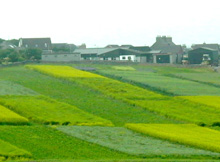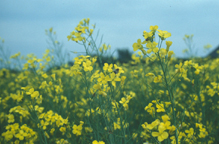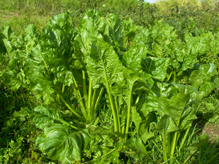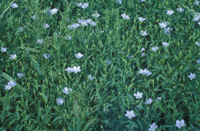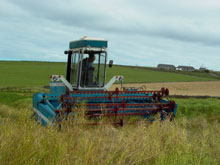Biofuels research
In 2004 the Agronomy Institute formed a partnership with a local SME, Westray Development Trust to undertake research into the potential for biofuel crops to reduce the island of Westray’s dependency on fossil fuel oils.
The objectives of the research were to:
• Investigate the agronomic potential
of spring oilseed rape, turnip rape, linseed and sugar beet through 1.5
ha of field trials.
• Prepare an energy balance.
• Review other biofuel crops through a literature research and make
recommendations on the economic viability of biofuel crops for future
research.
The field trial results showed that:
• The rape crops produced good yields (2.1-2.5 t/ha at 8% moisture content, in spite of being grown with a low level of inputs.
• The sugar beet yield was very poor (13.2 t/ha of fresh root).
• It was not possible to harvest the linseed because a prolonged period of wet weather resulted in the crop germinating in the field before it could be harvested.
The energy balance studies showed that:
• The energy inputs for the crops grown in Orkney were lower than generally reported elsewhere, mainly because of the low levels of inputs used.
• For rape, high energy inputs were required to dry the crops, particularly the oil seed rape which was harvested later than the turnip rape and had a higher moisture content.
The main conclusions from the trial are that:
• Rape is the most suitable of the crops investigated for biofuel production but varieties which can be harvested earlier need to be identified.
• Late maturing crops, such as linseed, are not suitable for the wetter northern climates found on Orkney.
• Locally sourced N inputs from animal manures and other organic waste products could significantly reduce the need for mineral N inputs.
Further research areas identified were:
• Research into the potential of cereal and potato crops for biofuel production.
• Research into the viability of producing high quality animal feeds from rape meal. This would reduce dependence on imported animal feeds and would increase the economic potential of biofuel manufacture.
• Investigate the potential for locally sourced organic waste products to be used in crop production. This would reduce the need for mineral N inputs and reduce the amount of material entering the waste stream, an important consideration in peripheral areas where waste management can be challenging and expensive.
• Field trial research into the best varieties of rape for biofuel production, that have a lower N requirement, resistance to wind damage and are not late maturing.
• The need to investigate the practical and economic viability of small-scale on-farm production of biodiesel in peripheral areas.
Funding restricts ongoing research, but field trials are currently investigating:
• The potential for winter oilseed rape cropping in northern climates where early harvesting is necessary but winter growing conditions are harsh.
• The yield and performance of other spring oil seed varieties.
Future opportunities
We are actively seeking further funding and partnerships with other research organisations, SMEs and larger companies to expand biofuel research and development and to work towards a sustainable model for biofuel production in the peripheral regions of Europe.
